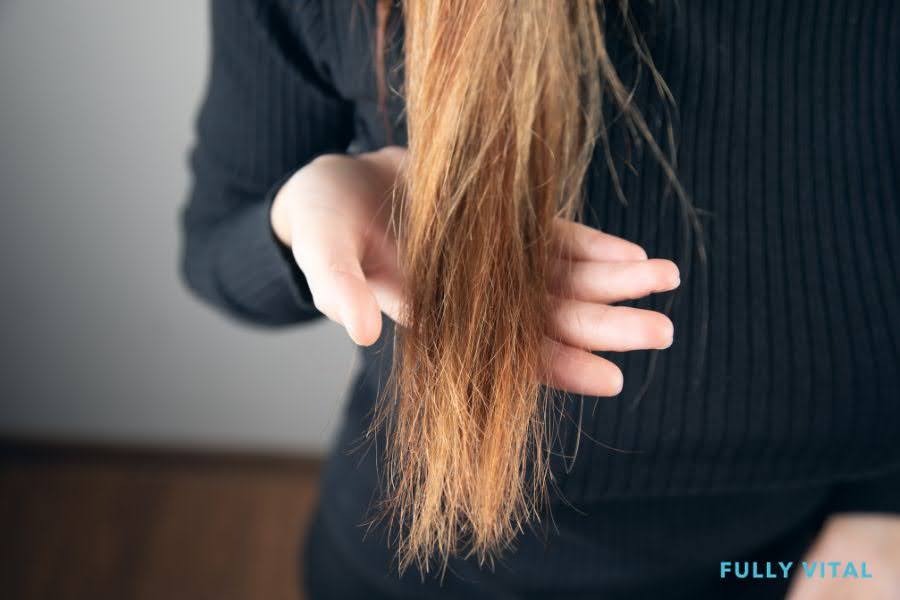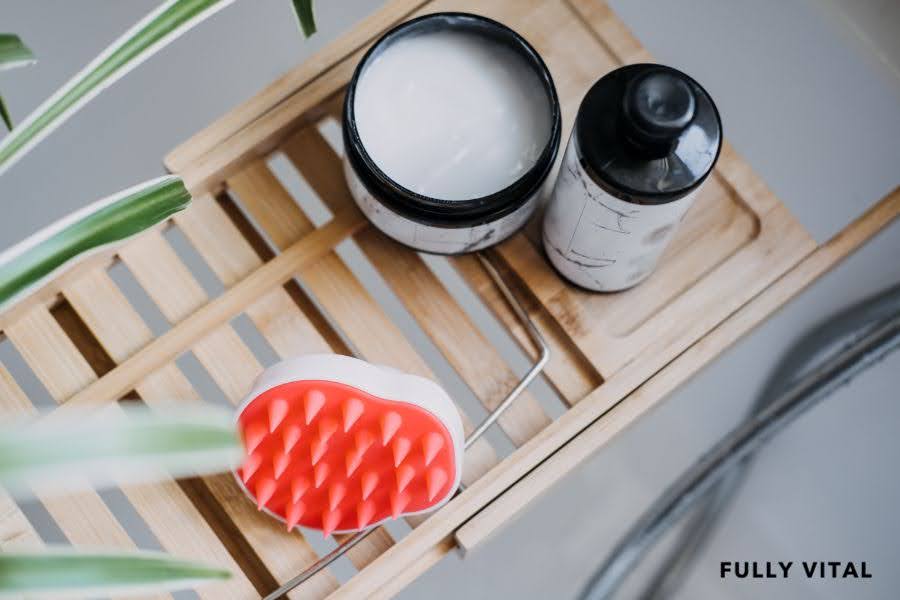
Protein Overload: Causes, Symptoms, And Solutions For Hair
Hair is often seen as a reflection of our overall health and well-being.
For many, it's not just about looks, but also how it feels and behaves.
Shiny, resilient, and voluminous hair is often pursued through various treatments and products, many of which are rich in proteins.
Proteins are indeed vital for strong hair, but an excess of anything can lead to trouble, and hair is no exception.
Protein overload, a lesser-known but prevalent concern, occurs when there is an accumulation of protein on the hair strands that leaves them stiff, brittle, and lifeless.
In this comprehensive guide, we'll delve into the causes and symptoms of protein overload, and more importantly, the solutions.
By understanding how our hair reacts to proteins and how to strike the right balance, we can prevent and reverse the damage, keeping our locks as vibrant and full of life as we desire.
Whether you're a hair care enthusiast or someone troubled by recent hair woes, there's valuable insight ahead that can lead to healthier, happier hair.
Don't let protein overload dull your shine! Explore FullyVital's selection of hair growth essentials, designed to promote balance and vitality.
Achieve the harmony your hair deserves.

I LOVE MY HAIR NOW
FullyVital hair serum and hair vitamins made tremendous improvements in my hair. I truly love my hair now.
Shop Hair ProductsWhat Is Protein Overload?
Proteins are the building blocks of hair—keratin, a type of protein, forms the primary structure of each strand.
Healthy hair relies on a delicate balance of protein and moisture to maintain its elasticity and strength.
When this balance is disrupted by an excess of protein, the very substance meant to fortify hair can become its downfall.
Protein treatments and products are designed to reinforce the hair's natural protein structure, particularly after chemical processes or heat styling, which can weaken the hair's integrity.
How Protein Overload Affects Hair
Protein overload manifests when hair is exposed to more protein than it can integrate beneficially.
This condition can harden the hair, strip it of its natural moisture, and lead to increased fragility.
Instead of being supple and resilient, hair becomes rigid and prone to breakage.
Rather than adding strength, the surplus protein can coat the hair, preventing moisture from penetrating the strands and leading to a dry, straw-like texture.
Understanding how protein interacts with hair is crucial in avoiding overload and maintaining hair health.
Causes Of Protein Overload
Protein overload, also known as protein sensitivity, occurs when the hair becomes overwhelmed with too much protein.
This can lead to hair that feels dry, brittle, and prone to breakage.
Protein overload is more common in individuals with certain hair types, such as fine or low-porosity hair, but it can affect anyone.
Common Sources Of Excessive Protein
The journey to protein overload often begins with the best intentions: a quest for stronger, more resilient hair.
Protein-infused shampoos, conditioners, and treatments are common culprits, as they are frequently used in hair care routines.
Additionally, leave-in conditioners and styling products claiming to repair or "rebuild" hair can contribute to protein accumulation.
The protein sources vary, ranging from silk, keratin, collagen, and various amino acids.
When these products are used excessively or without the need for additional protein, they can lead to overload.
Hair Care Practices Leading To Overload
Protein overload isn't just about the products; it's also how we use them.
Overdoing protein treatments, especially on hair that isn't damaged or already has sufficient protein, increases the risk of overload.
It's not uncommon to assume that if a little protein is good, more must be better.
However, this approach can backfire.
A key practice leading to overload is not alternating protein treatments with moisturizing treatments, resulting in an imbalance in the hair's moisture-protein equation.
Understanding one's hair type and its current condition is essential in determining the frequency and type of protein treatment required.
Symptoms Of Protein Overload
Protein overload, also known as protein sensitivity, can manifest in various ways, and the symptoms may vary from person to person.
Physical Signs In Hair
Protein overload can be identified by a distinct set of characteristics in the hair.
These symptoms include brittleness, stiff or straw-like texture, and a noticeable lack of elasticity.
Hair may also become unusually tangly or knotty, and combs or brushes may snag more frequently due to the roughened cuticle surface caused by excess protein coating the hair.
In severe cases, the hair may start to snap off easily when brushed or manipulated, leading to increased breakage and split ends.
Changes In Hair Texture And Appearance
The visual appearance of hair suffering from protein overload can change significantly.
Hair may lose its natural shine and appear dull and lifeless, as the overloaded protein creates a barrier that reflects light poorly.
Additionally, natural curls or waves may lose their definition and become limp due to the rigidness of the strands.
Contrastingly, for some, their hair might become unusually voluminous in an unmanageable way, as the strands stand away from each other due to the rough texture.
Recognizing these signs early can make the difference in preventing further damage and restoring hair health.

Diagnosing Protein Overload
Diagnosing protein overload or protein sensitivity in your hair typically involves a combination of self-assessment and the guidance of a knowledgeable hairstylist or trichologist (a specialist in hair and scalp conditions).
Self-Assessment
Identifying protein overload begins with a thorough self-assessment of your hair's health.
If your hair feels dry, stiff, and brittle despite the use of protein-rich hair treatments, it's likely experiencing protein overload.
Conduct a simple strand test by stretching a wet hair strand gently: if it snaps readily without stretching, your hair might be protein-heavy.
Additionally, pay attention to how your hair responds after washing and conditioning—is it hard to detangle, or does it feel like straw? These tactile cues are key indicators of protein imbalance.
When To Consult A Professional
While self-assessment is a good starting point, it is also wise to consult a hair care professional if you suspect protein overload, particularly if you're unsure about evaluating your hair's condition.
A professional stylist or trichologist can provide an accurate diagnosis and recommend appropriate treatments.
They can also provide guidance on hair care products and routines suited to your hair type and condition.
Their expertise can be invaluable in correcting protein overload and preventing future recurrences.
Solutions For Managing Protein Overload
Managing protein overload in your hair involves adjusting your hair care routine to restore the balance between protein and moisture.
Adjusting Hair Care Routine
Once protein overload is identified, the first step to recovery is to adjust your hair care routine.
This involves temporarily eliminating protein-based products to give your hair a break from excess protein.
Instead, focus on hydrating and moisturizing treatments that restore moisture balance.
Look for products that contain emollients, humectants, and occlusives such as shea butter, glycerin, and oils.
Introduce these products gradually, and monitor your hair’s response, adjusting the frequency and quantity based on how your hair reacts.
Balancing Moisture And Protein
Achieving a healthy balance between moisture and protein is essential for restoring hair to its optimal state.
Deep conditioning treatments are beneficial, as they penetrate the hair shaft and replenish lost moisture.
Incorporating a leave-in conditioner can also help maintain the hair's moisture throughout the day.
It's crucial to understand that this balance is not a one-size-fits-all solution; it varies per individual.
Some may require more frequent moisturizing treatments than others.
Over time, you can slowly reintroduce protein treatments when your hair's elasticity improves, but always in moderation and balanced with moisture to prevent a recurrence of overload.
Home Remedies For Protein Overload
While managing protein overload in your hair typically involves adjusting your hair care routine and using specific products, there are some home remedies and natural treatments that may help restore the balance between protein and moisture.
Keep in mind that individual results may vary, and it's essential to be patient when trying home remedies.
Natural Treatments
For those who prefer a natural route, there are home remedies that can assist in correcting protein overload.
Ingredients from your kitchen, like honey, aloe vera, and apple cider vinegar, can provide soothing and hydrating effects.
Honey is a natural humectant that attracts moisture, while aloe vera's vitamins and minerals can help to soften and hydrate the hair.
Apple cider vinegar can help to balance the scalp's pH and remove product buildup, which may include excess protein.
These natural remedies can be used in homemade hair masks or rinses to gently restore the hair's moisture without adding more protein.
Diy Hair Masks
Creating your own DIY hair masks allows you to control what goes into your hair care regimen and avoid any unwanted protein.
A popular mask involves a mixture of banana for its high potassium content, olive oil for its moisturizing properties, and honey for its ability to retain moisture.
Apply the mask to damp hair, let it sit for a substantial period to allow penetration, and then wash it out gently.
Regularly treating your hair with such masks can help to counteract the effects of protein overload and re-establish the necessary moisture for healthy, pliable hair.

Preventing Protein Overload In The Future
Preventing protein overload in the future involves maintaining a balanced hair care routine that addresses your hair's specific needs.
How To Choose The Right Hair Care Products
To prevent protein overload, it's crucial to choose hair care products wisely.
Start by reading labels and understanding the ingredients.
Look for products that have a balance of protein and moisturizing agents or are specifically formulated for moisture.
Avoid products with protein listed near the top of the ingredient list if your hair doesn't require additional strength.
It's also beneficial to alternate between protein treatments and moisturizing treatments if you include proteins in your regimen.
Consulting a professional to understand your hair type and its specific needs can also help in selecting the right products to maintain a healthy balance.
Best Practices For Hair Health
Consistency and moderation are the keys to maintaining hair health and avoiding protein overload.
It's important to develop a hair care routine tailored to your hair's needs and to adjust it according to changing factors like the environment, styling habits, and hair treatments.
Regular trimming helps to keep hair in good shape and prevent damage from spreading.
Additionally, protecting your hair from harsh environmental elements, such as the sun and wind, and minimizing the use of heat styling tools can prevent unnecessary stress on your hair.
By adopting best practices, not only can you prevent protein overload, but you can also sustain the overall health and beauty of your hair.
Discover the Power of Fully Vital Hair Growth ProductsWith Fully Vital hair growth products, you can experience a wide range of key features and benefits that will help you achieve healthier, more youthful-looking hair. Here are some of the reasons why you should consider using our products:
Don't wait any longer to bring the power of Fully Vital hair growth products into your hair care routine. Experience the difference today and give your hair the care and attention it deserves. |
Final Thoughts On Protein Overload
To wrap up our discussion on protein overload, it’s pivotal to be aware that while protein is a valuable component in maintaining hair strength and structure, too much of it can lead to adverse effects.
By understanding the causes and symptoms of protein overload, and by taking appropriate measures to restore balance, you can regain your hair's natural vitality and shine.
Always read product labels, choose your hair care regimen wisely, and listen to your hair's response to treatments.
Remember, healthy hair is not just about what you put on it, but also about a holistic approach that includes a balanced diet and proper hair maintenance practices.
With the right knowledge and tools, you can both prevent and remedy protein overload, keeping your hair full of life and vitality.
Restore your hair's bounce and beauty from protein overload with FullyVital's proven hair growth solutions.
Trust in science to bring back your hair's natural vibrancy.
Check out our recent blogs:
- The Waiting Game: When Does Biotin Start Working?
- Dealing With Trichostasis Spinulosa: Tips For Relief And Recovery
- Patience Pays Off: Understanding Biotin's Time Frame For Results
Frequently Asked Questions
Does temperature affect protein overload in hair?
Extreme temperatures and environmental conditions can exacerbate protein overload in hair, making it essential to protect hair from such extremes.1
What happens if protein overload in hair is left untreated?
If left untreated, protein overload can lead to further hair damage, increased breakage, and overall deterioration in hair health.2
How can I tell if my hair has protein overload?
Symptoms include increased shedding, dullness, a lack of luster, and a dry, brittle texture.
Your hair may feel stiff and straw-like, and it may become more tangled and prone to breakage.3
What are the signs your hair has too much protein?
Increased hair shedding, a lack of luster, and dry, brittle strands are signs that your hair may have too much protein.
It might also lose its shine and become difficult to manage.4
How do you fix protein overload in hair?
To address protein overload, switch to moisturizing products to restore the protein-moisture balance.
Cut back on protein treatments and incorporate deep conditioning treatments that focus on hydration.5
Can you reverse protein overload?
Yes, protein overload can be reversed by reintroducing moisture into the hair and temporarily avoiding high-protein products.
Recovery may include using nourishing conditioners, masks, and leave-in treatments that are rich in moisture.
How can protein overload be prevented?
Prevent protein overload by using protein treatments sparingly and only when needed.
Choose hair products wisely and maintain a balance between protein-rich products and those that provide moisture.
What should I do if I have used too much protein?
If you've used too much protein, you should immediately start using moisturizing products and treatments to restore hydration.
It's also advisable to cut out all protein treatments until your hair's moisture levels are balanced.
Are certain hair types more susceptible to protein overload?
Any hair type can suffer from protein overload if exposed to excess protein, though the signs may vary.
It's not hair type, but the balance of protein and moisture that affects susceptibility.
Why is my hair stiff after a protein treatment?
Your hair may feel stiff after a protein treatment if it did not require the additional protein, leading to an imbalance where protein outweighs moisture.
This stiffness is a sign of protein overload.
Sources:
- mindbodygreen. (2022, January 13). Protein Overload: How To Tell & The Best Products To Fix It. Retrieved from https://www.mindbodygreen.com/articles/protein-overload
- Healthline. (n.d.). Too Much Protein in Hair: Causes, Effects, and More. Retrieved from https://www.healthline.com/health/beauty-skin-care/too-much-protein-in-hair
- Salonworthyhair. (n.d.). How to Fix Protein Overload in Hair - 11 Easy Solutions. Retrieved from https://salonworthyhair.com/fix-protein-overload-hair
- Atlas Bars. (n.d.). Protein Overload: How to Address and Fix Protein Overload in Hair. Retrieved from https://atlasbars.com/blogs/protein-explained/protein-overload-how-to-address-and-fix-protein-overload-in-hair
- Grow Gorgeous. (n.d.). What is Protein Overload in Hair and How to Fix it. Retrieved from https://www.growgorgeous.com/blog/tips-tutorials/what-is-protein-overload-in-hair-and-how-to-fix-it








